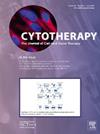Expansion of tumor-infiltrating and marrow-infiltrating lymphocytes from pediatric malignant solid tumors
IF 3.7
3区 医学
Q2 BIOTECHNOLOGY & APPLIED MICROBIOLOGY
引用次数: 0
Abstract
Introduction
The expansion of tumor-infiltrating lymphocytes (TIL) for adoptive cellular therapy is under investigation in many solid tumors of adulthood. Marrow-infiltrating lymphocytes (MIL) have demonstrated antitumor reactivity preclinically. Successful expansion of TIL/MIL has not been reported across pediatric solid tumor histologies. The objective of this study was to demonstrate successful expansion of TIL from pediatric solid tumors for translation in an adoptive cell therapy (ACT) treatment strategy.
Methods
A prospective study of TIL/MIL expansion was performed on solid tumors of pediatric patients undergoing standard-of-care procedures. TIL/MIL expansions were performed in the presence of high-dose interleukin 2. To demonstrate a full-scale expansion to clinically-relevant cell doses for TIL therapy, initial TIL culture was followed by a rapid expansion protocol for select patients. Expanded specimens were analyzed for phenotype by flow cytometry and for anti-tumor reactivity by the interferon-gamma release assay.
Results
Eighteen tumor samples were obtained. Initial TIL cultures were successfully generated from 14/18 samples (77.7%). A median of 5.52 × 107 (range: 2.5 × 106–3.23 × 108) cells were produced from initial cultures, with 46.9% expressing a CD3 phenotype (46.9%). Eight samples underwent rapid expansion, demonstrating a median 458-fold expansion and a CD3 phenotype of 98%. Initial MIL cultures were successfully generated from five samples, with a predominantly CD3 phenotype (45.2%). Sufficient tumor tissue was only available for seven TIL samples to be tested for reactivity; none demonstrated responsiveness to autologous tumor.
Conclusions
TIL and MIL expansion from pediatric solid tumors was successful, including the full-scale expansion process. This data supports translation to an ACT-TIL treatment strategy in the pediatric population and thus a Phase I trial of ACT-TIL in pediatric high-risk solid tumors is planned.
从小儿恶性实体瘤中扩增肿瘤浸润和骨髓浸润淋巴细胞。
导言:目前正在研究扩增肿瘤浸润淋巴细胞(TIL)用于成年期多种实体瘤的采纳性细胞疗法。骨髓浸润淋巴细胞(MIL)在临床前已显示出抗肿瘤反应性。目前还没有关于成功扩增小儿实体瘤组织学的报道。本研究的目的是证明从小儿实体瘤中成功扩增 TIL,并将其应用于采用性细胞疗法 (ACT) 治疗策略中:方法:对接受标准治疗程序的儿科实体瘤患者进行TIL/MIL扩增的前瞻性研究。TIL/MIL扩增是在高剂量白细胞介素2存在的情况下进行的。 为了证明TIL疗法的细胞剂量与临床相关,在初始TIL培养后对部分患者进行了快速扩增。通过流式细胞术分析扩增标本的表型,并通过γ干扰素释放试验分析抗肿瘤反应性:结果:共获得 18 份肿瘤样本。14/18个样本(77.7%)成功生成了初始TIL培养物。初始培养物产生的细胞中位数为 5.52 × 107(范围:2.5 × 106-3.23 × 108)个,其中 46.9% 表达 CD3 表型(46.9%)。有 8 个样本进行了快速扩增,扩增中位数为 458 倍,CD3 表型占 98%。五个样本成功生成了初始 MIL 培养物,主要表型为 CD3(45.2%)。只有7个TIL样本有足够的肿瘤组织进行反应性检测;没有一个样本显示对自体肿瘤有反应:结论:从小儿实体瘤中扩增 TIL 和 MIL 是成功的,包括大规模扩增过程。这些数据支持在儿科人群中应用 ACT-TIL 治疗策略,因此计划在儿科高风险实体瘤中进行 ACT-TIL 的 I 期试验。
本文章由计算机程序翻译,如有差异,请以英文原文为准。
求助全文
约1分钟内获得全文
求助全文
来源期刊

Cytotherapy
医学-生物工程与应用微生物
CiteScore
6.30
自引率
4.40%
发文量
683
审稿时长
49 days
期刊介绍:
The journal brings readers the latest developments in the fast moving field of cellular therapy in man. This includes cell therapy for cancer, immune disorders, inherited diseases, tissue repair and regenerative medicine. The journal covers the science, translational development and treatment with variety of cell types including hematopoietic stem cells, immune cells (dendritic cells, NK, cells, T cells, antigen presenting cells) mesenchymal stromal cells, adipose cells, nerve, muscle, vascular and endothelial cells, and induced pluripotential stem cells. We also welcome manuscripts on subcellular derivatives such as exosomes. A specific focus is on translational research that brings cell therapy to the clinic. Cytotherapy publishes original papers, reviews, position papers editorials, commentaries and letters to the editor. We welcome "Protocols in Cytotherapy" bringing standard operating procedure for production specific cell types for clinical use within the reach of the readership.
 求助内容:
求助内容: 应助结果提醒方式:
应助结果提醒方式:


